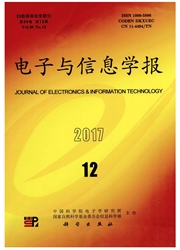

 中文摘要:
中文摘要:
An approach to make heterogeneous devices cooperate with each other to provide ubiquitous service remains a longstanding challenge in ubiquitous environments. In addition, when multi-user request ubiquitous services simultaneously, the arbitrariness in resource allocation process easily leads to non-equilibrium of qualities of multiuser’s services. Thus, How to design an effective heterogeneous devices cooperation mechanism that meet the QoS requirements and also equilibrate QoS among multi-user’s services becomes a very tough problem. In the paper, Equilibrium Index and Theil Utility function are imported to establish a multidevice equilibrium cooperation model, which is benefit for resource allocation in ubiquitous environments. Then a Theil-Equilibrium based Cooperation Mechanism for multi-service is proposed. Firstly, in order to simplify calculating, a dimensionless processing is introduced. After that, a cooperation approach with Theil-Utility Heuristic algorithm is designed to choose the best solution for the simplified model. At last, the mechanism is simulated in a smart home scenario. The simulation results show that this mechanism outperforms non-equilibrium method by improving almost 40% in internal equilibrium with just reducing 0-2% in the total utility ofall the requested ubiquitous services. These data show that the proposed mechanism performs well in equilibrating qualities of multi-user’s ubiquitous services.
 英文摘要:
英文摘要:
An approach to make heterogeneous devices cooperate with each other to provide ubiquitous service remains a longstanding challenge in ubiquitous environments. In addition, when multi-user request ubiquitous services simultaneously, the arbitrariness in resource allocation process easily leads to non-equilibrium of qualities of multi- user's services. Thus, How to design an effective heterogeneous devices cooperation mechanism that meet the QoS requirements and also equilibrate QoS among multi-user's services becomes a very tough problem. In the paper, Equilibrium Index and Theil Utility function are imported to establish a multi- device equilibrium cooperation model, which is benefit for resource allocation in ubiquitous environments. Then a Theil-Equilibrium based Cooperation Mechanism for multi-service is proposed. Firstly, in order to simplify calculating, a dimensionless processing is introduced. After that, a cooperation approach with Theil-Utility Heuristic algorithm is designed to choose the best solution for the simplified model. At last, the mechanism is simulated in a smart home scenario. The simulation results show that this mechanism outperforms non-equilibrium method by improving almost 40% in internal equilibrium with just reducing 0-2% in the total utility of all the requested ubiquitous services. These data show that the proposed mechanism performs well in equilibrating qualities of multi-user's ubiquitous services.
 同期刊论文项目
同期刊论文项目
 同项目期刊论文
同项目期刊论文
 An efficient server bandwidth costs decreased mechanism for asynchronous streaming in cloud-assisted
An efficient server bandwidth costs decreased mechanism for asynchronous streaming in cloud-assisted Application semi-group property of enhanced Chebyshev polynomials to anonymous authentication protoc
Application semi-group property of enhanced Chebyshev polynomials to anonymous authentication protoc Cryptanalysis and improvement of a multi-user quantum communication network using χ-type entangled s
Cryptanalysis and improvement of a multi-user quantum communication network using χ-type entangled s Self-organizing Energy-saving Management Mechanism based on Pilot Power Adjustment in Cellular Netwo
Self-organizing Energy-saving Management Mechanism based on Pilot Power Adjustment in Cellular Netwo An anonymous user authentication with key agreement scheme without pairings for multi-server archite
An anonymous user authentication with key agreement scheme without pairings for multi-server archite SBDP: Bandwidth Prediction Mechanism towards Server Demands in P2P-VoD System. Peer-to-Peer Networki
SBDP: Bandwidth Prediction Mechanism towards Server Demands in P2P-VoD System. Peer-to-Peer Networki 期刊信息
期刊信息
